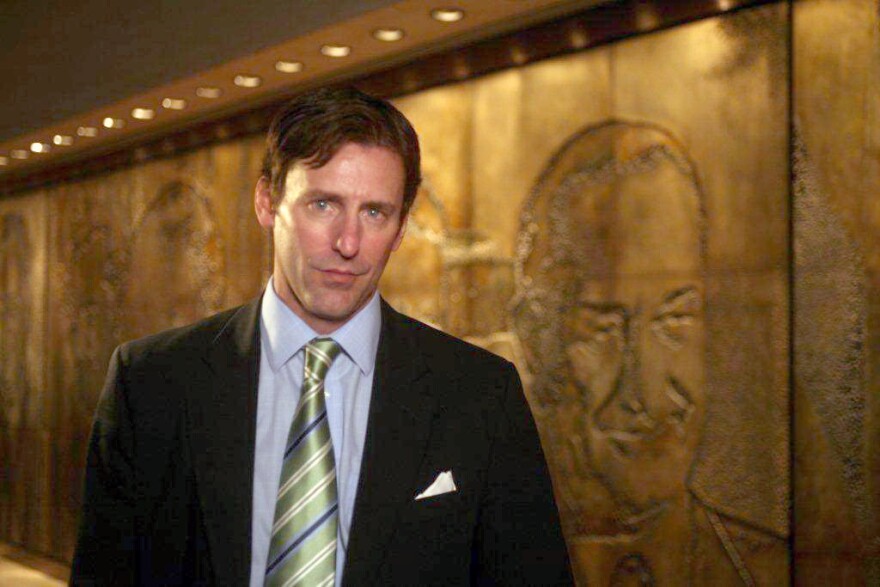John F. Kennedy, the young President from Massachusetts, had a complicated relationship with his vice president, Texas dealmaker Lyndon Johnson.
But historian Mark Updegrove, director of the LBJ Presidential Library in Austin, believes the two men had developed mutual respect by the time they visited Dallas on Nov. 22, 1963.
At Dallas Love Field, any concerns that Texans didn’t love their president had dissolved. Adoring fans cheered wildly and waved as President Kennedy and the First Lady stepped from Air Force One and climbed into an open limousine.
In an audio recording Lady Bird Johnson made later that day, she recalled the admiring crowds that lined the path of the motorcade as it cruised through downtown Dallas.
“The streets were lined with people, lots and lots of children all smiling, placards, confetti, people waving from windows,” she said.
"A rattlesnake charming a rabbit"

Updegrove says the visit began just as Johnson had hoped.
“He wanted Texas to smile on President Kennedy," he said. "The crowds were enormous and effusive in their adoration. So no one was more pleased than Lyndon Johnson.”
Updegrove says any resentment Johnson felt at losing the Democratic presidential nomination to Kennedy in 1960 had passed. Johnson expected to be Kennedy’s running mate again in 1964, and the Texas trip was planned in part to raise important campaign contributions.
Then the motorcade passed the Texas School Book Depository.
“There was a sharp, loud report. A shot,” Mrs. Johnson recorded in her audio diary.
At first she thought it might be firecrackers, part of the celebration. But then she heard two more shots. She remembered a Secret Service agent throwing the vice president to the floor of their car and the motorcade racing towards Parkland Hospital.
At 2:38 p.m., a little more than two hours after the shooting, Vice President Johnson was back at Love Field aboard Air Force One, being sworn in by Judge Sarah Hughes as the 36th president of the United States.
“I think he had no doubts about his ability to lead and govern,” Updegrove said.
As for whether Johnson worried Americans would not love him the way they adored Kennedy: “One of the things he said was that the media was so charmed by Kennedy, like a rattlesnake charming a rabbit," Updegrove said. "He realized probably in his most candid moments that he didn’t have that charisma.”
LBJ's power to persuade
But Updegrove says Lyndon Johnson had other powers, including the ability to persuade.
In the coming days, those powers of the new president would be tested, as the world wondered about assassination conspiracies and the ability of the United States to persevere.
Johnson acted quickly to investigate President Kennedy’s murder. He conferred with former Presidents Truman and Eisenhower. He tried to reassure world leaders.
Three days after the shooting, in a phone conversation, he promised Martin Luther King Jr. he’d continue Kennedy’s civil rights initiatives.
King told Johnson: “One of the great tributes that we can pay in memory of President Kennedy is to try to enact some of the great progressive policies he sought to initiate.”
Johnson responded: “Well, I’m going to support them all and you can count on that and I’m going to do my best to get other men to do likewise and I’ll have to have y’all’s help. And I’ve never needed it more than I do now.”
King said: “Well, you know you have it. And just feel free to call on us for anything.”
LBJ: Unable to inspire, but able to deliver
Then on Nov 27, five days after the assassination, President Johnson addressed a joint session of Congress for the first time.
“All I have I would have given gladly not to be standing here today,” he said, pledging to deliver on a long list of John F. Kennedy’s “dreams” which included space exploration, taking the Peace Corps to less-developed nations and guaranteeing equal rights for all Americans regardless of race or color.
“It wasn’t so much Kennedy’s legacy Johnson was aiming at in his own presidency,” Updegrove said. “It was a continuation of the New Deal. He wanted to finish what FDR had begun in his administration. And one of the things he [FDR] left unaddressed was civil rights. LBJ believed he could do it and did."
Updegrove says Johnson went further that predecessors had planned to ensure civil rights by passing the Voting Rights Act of 1965 and the Fair Housing Act of 1968.
His critics remember that Johnson increased American troops in Vietnam -- casualties soared. His admirers remember him for his Great Society legislation that included Medicare, Medicaid and the War on Poverty.
Updegrove sees Kennedy and Johnson as complementary figures in history. He agrees with Liz Carpenter, an aide to President and Lady Bird Johnson, who put it this way:
“John F. Kennedy inspired, which Johnson was incapable of doing. And Lyndon Johnson delivered.”
Listen to Lady Bird Johnson talk about the assassination in her audio diary -- part one:
http://youtu.be/csQFsehnARc
Listen to Lady Bird Johnson talk about the assassination in her audio diary -- part two:
http://youtu.be/ESQj8JnbdLc
Watch Lyndon Johnson address the country once he's returned to Washington, D.C.:
http://youtu.be/GsOXuCrQ4g8
Learn more about LBJ
Visit the LBJ Presidential Library's online exhibit: "Nov. 22, 1963: Tragedy And Transition"





